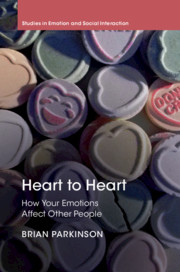Book contents
- Heart to Heart
- Studies in Emotion and Social Interaction
- Heart to Heart
- Copyright page
- Dedication
- Contents
- Figures
- Preface
- Acknowledgements
- Chapter 1 What’s at the Heart of Emotions?
- Chapter 2 Words and Concepts
- Chapter 3 Facial Activity and Emotion Expression
- Chapter 4 Explaining Emotional Influence
- Chapter 5 Regulating Emotions
- Chapter 6 Social Functions
- Chapter 7 Groups, Teams and Crowds
- Chapter 8 Working with Emotions
- Chapter 9 Reorientation
- References
- Index
- Studies in Emotion and Social Interaction
Chapter 4 - Explaining Emotional Influence
Published online by Cambridge University Press: 28 October 2019
- Heart to Heart
- Studies in Emotion and Social Interaction
- Heart to Heart
- Copyright page
- Dedication
- Contents
- Figures
- Preface
- Acknowledgements
- Chapter 1 What’s at the Heart of Emotions?
- Chapter 2 Words and Concepts
- Chapter 3 Facial Activity and Emotion Expression
- Chapter 4 Explaining Emotional Influence
- Chapter 5 Regulating Emotions
- Chapter 6 Social Functions
- Chapter 7 Groups, Teams and Crowds
- Chapter 8 Working with Emotions
- Chapter 9 Reorientation
- References
- Index
- Studies in Emotion and Social Interaction
Summary
This chapter discusses how and why emotions affect other people’s actions, appraisals and emotions. One popular explanation of interpersonal influence is primitive emotional contagion. According to this account, people arrive at similar emotional states because they copy one another’s gestures and expressions (mimicry). The feelings and sensations produced by these gestures and expressions then produce convergent emotional experiences (interoceptive feedback). However, mimicry effects are too selective and feedback effects too weak to make this process work consistently. An alternative process is social appraisal, which involves calibrating emotional orientations to objects or events in the shared environment. Most studies of social appraisal present participants with verbal or facial information about someone else’s emotion and assess their inferences about that information. However, relation alignment may also operate at a more implicit level when people adjust to each other’s developing object-directed signals and movements. Similar processes may also produce divergent or conflicting emotional orientations when two people approach the same event from different angles or interpret its consequences in different ways.
Keywords
- Type
- Chapter
- Information
- Heart to HeartHow Your Emotions Affect Other People, pp. 133 - 193Publisher: Cambridge University PressPrint publication year: 2019

